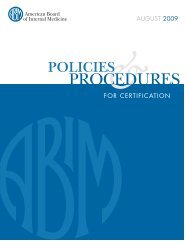The SRA Symposium - College of Medicine
The SRA Symposium - College of Medicine
The SRA Symposium - College of Medicine
You also want an ePaper? Increase the reach of your titles
YUMPU automatically turns print PDFs into web optimized ePapers that Google loves.
Papers<br />
for board members, reviewing oral histories, and available resources. Though the information<br />
gathered from this survey could be very beneficial to research administrators, many difficulties<br />
arose while trying to gather the data.<br />
I encountered many barriers during the different steps <strong>of</strong> this project, which led to a mere project<br />
update rather than a complete project. First, while I was searching the web for contact names, some<br />
institutions did not provide information on their website about their IRB. Others were simply difficult<br />
to navigate and required a lot <strong>of</strong> digging to locate the contact information. Those for which I<br />
could not locate contact information I called inquiring about a person <strong>of</strong> contact for the IRB. Some<br />
institutions said they did not have an IRB, and some transferred me several times before finding<br />
that they could not help me. Those institutions that I was able to obtain contact information for<br />
were sent the survey via e-mail. However, some e-mail addresses would not send correctly or no<br />
longer existed. For these I made further attempts via the internet and telephone calls to obtain the<br />
correct contact information. Once I had done everything I could to contact IRB administrators, I<br />
waited for responses to the survey. After a couple <strong>of</strong> weeks, I sent reminders on two separate occasions<br />
to please complete the survey and send back to me. As <strong>of</strong> now, I have received only 38% <strong>of</strong> the<br />
surveys that I sent out. With those I did receive, there are some visible trends among Institutional<br />
Review Boards at predominantly undergraduate institutions in the South.<br />
Preliminary Results<br />
With a 38% return <strong>of</strong> the surveys sent to research administrators, I cannot draw any conclusions<br />
from the data. However, there are preliminary results that may represent current trends within<br />
IRB infrastructures. Included in these preliminary results is the degree <strong>of</strong> concern <strong>of</strong> pertinent issues<br />
that Institutional Review Boards are faced with. <strong>The</strong> importance <strong>of</strong> some <strong>of</strong> the issues reflects<br />
other information about Institutional Review Boards at the responding institutions.<br />
Overall, training <strong>of</strong> IRB members and investigators are <strong>of</strong> greatest concern among respondents.<br />
Although training is <strong>of</strong> top priority for research administrators and IRBs, the training requirements<br />
at these institutions do not reflect that concern. Of the data collected thus far, only 67%<br />
require all IRB applicants to complete training. Institutions that do require training utilize a<br />
variety <strong>of</strong> training sources, including the NIH/OHRP website, in-house training programs, videos,<br />
and the National Cancer Institute website. A larger percentage, 73%, provides training to student<br />
groups and classes, which is representative <strong>of</strong> the concern for training. Although training may not<br />
be required for all applicants at some institutions, there is an effort to educate and train students<br />
about research involving human subjects. At the Board level, training seems to be <strong>of</strong> greater importance<br />
with 87% <strong>of</strong> the responding institutions providing training to Board members through<br />
several different sources. Human subjects training at all levels is gaining greater importance as<br />
public awareness <strong>of</strong> human subjects protections increases. About half (53%) <strong>of</strong> the institutions<br />
have an IRB Manual, which will facilitate the attempt to educate and train investigators, IRB members,<br />
university communities, and the public about the protection <strong>of</strong> human subjects in research.<br />
<strong>The</strong> same percentage have a Federal Wide Assurance (FWA), which requires an IRB to have its<br />
policies and procedures readily available upon request by the Office for Human Research Protections.<br />
It may be that institutions only see the need to develop a policy and procedures manual if it<br />
is required to do so. With limited resources and staffing for Institutional Review Boards, developing<br />
a manual can be difficult and unfeasible.<br />
130 2005 <strong>Symposium</strong> Proceedings Book

















